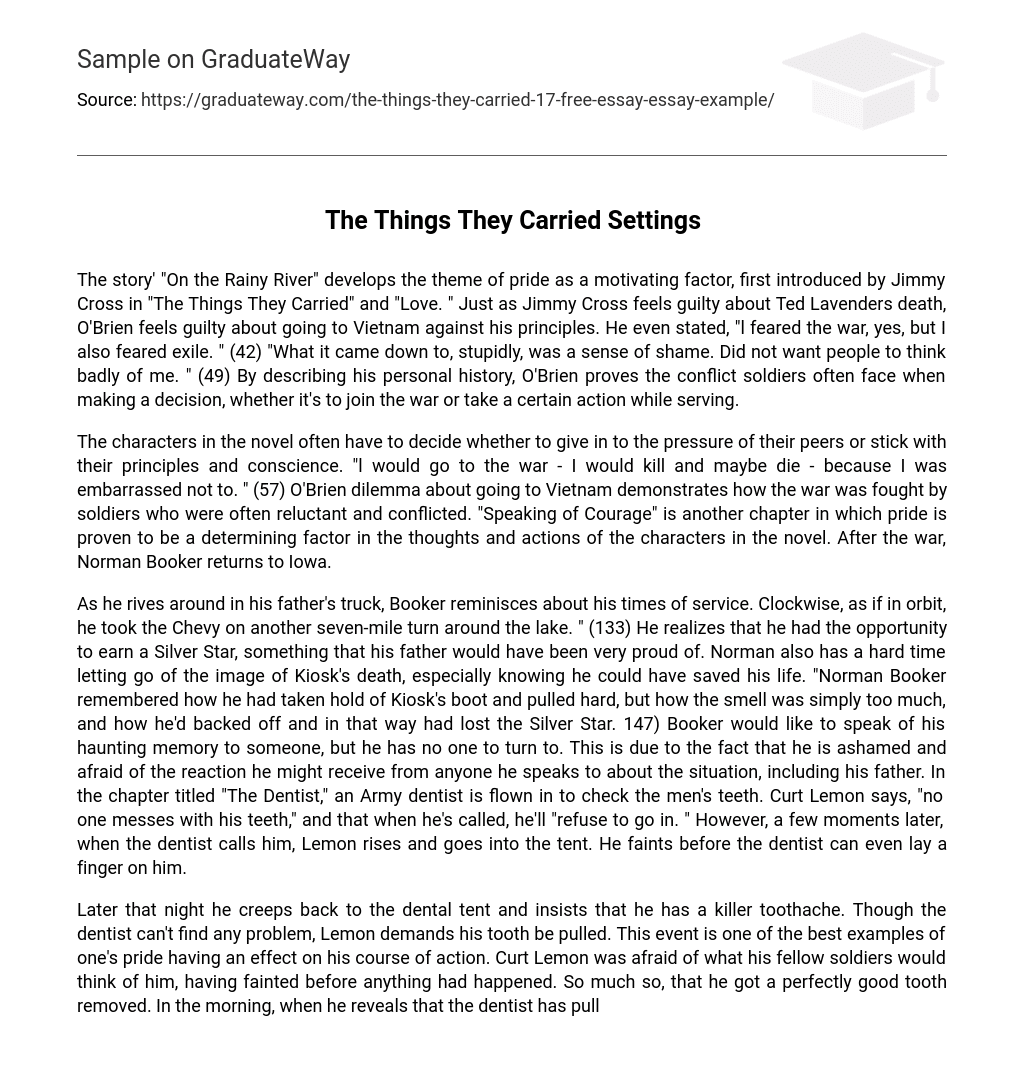The story’ “On the Rainy River” develops the theme of pride as a motivating factor, first introduced by Jimmy Cross in “The Things They Carried” and “Love. ” Just as Jimmy Cross feels guilty about Ted Lavenders death, O’Brien feels guilty about going to Vietnam against his principles. He even stated, “l feared the war, yes, but I also feared exile. ” (42) “What it came down to, stupidly, was a sense of shame. Did not want people to think badly of me. ” (49) By describing his personal history, O’Brien proves the conflict soldiers often face when making a decision, whether it’s to join the war or take a certain action while serving.
The characters in the novel often have to decide whether to give in to the pressure of their peers or stick with their principles and conscience. “l would go to the war – I would kill and maybe die – because I was embarrassed not to. ” (57) O’Brien dilemma about going to Vietnam demonstrates how the war was fought by soldiers who were often reluctant and conflicted. “Speaking of Courage” is another chapter in which pride is proven to be a determining factor in the thoughts and actions of the characters in the novel. After the war, Norman Booker returns to Iowa.
As he rives around in his father’s truck, Booker reminisces about his times of service. Clockwise, as if in orbit, he took the Chevy on another seven-mile turn around the lake. ” (133) He realizes that he had the opportunity to earn a Silver Star, something that his father would have been very proud of. Norman also has a hard time letting go of the image of Kiosk’s death, especially knowing he could have saved his life. “Norman Booker remembered how he had taken hold of Kiosk’s boot and pulled hard, but how the smell was simply too much, and how he’d backed off and in that way had lost the Silver Star. 147) Booker would like to speak of his haunting memory to someone, but he has no one to turn to. This is due to the fact that he is ashamed and afraid of the reaction he might receive from anyone he speaks to about the situation, including his father. In the chapter titled “The Dentist,” an Army dentist is flown in to check the men’s teeth. Curt Lemon says, “no one messes with his teeth,” and that when he’s called, he’ll “refuse to go in. ” However, a few moments later, when the dentist calls him, Lemon rises and goes into the tent. He faints before the dentist can even lay a finger on him.
Later that night he creeps back to the dental tent and insists that he has a killer toothache. Though the dentist can’t find any problem, Lemon demands his tooth be pulled. This event is one of the best examples of one’s pride having an effect on his course of action. Curt Lemon was afraid of what his fellow soldiers would think of him, having fainted before anything had happened. So much so, that he got a perfectly good tooth removed. In the morning, when he reveals that the dentist has pulled his tooth, he is proud, having defeated his ROR nervous reaction (fainting) with an obvious display of manliness.
Pride not only motivates reluctant men to go to Vietnam, but also affects soldiers’ relationships with each other once there. Concern about social acceptance is what leads O’Brien characters to take absurd or dangerous actions during war. O’Brien uses these characters to show that although traditional reasons such as patriotism are still in place, pride and fear of shame is often an unavoidable motivation for going to war as well as taking certain actions while there.





